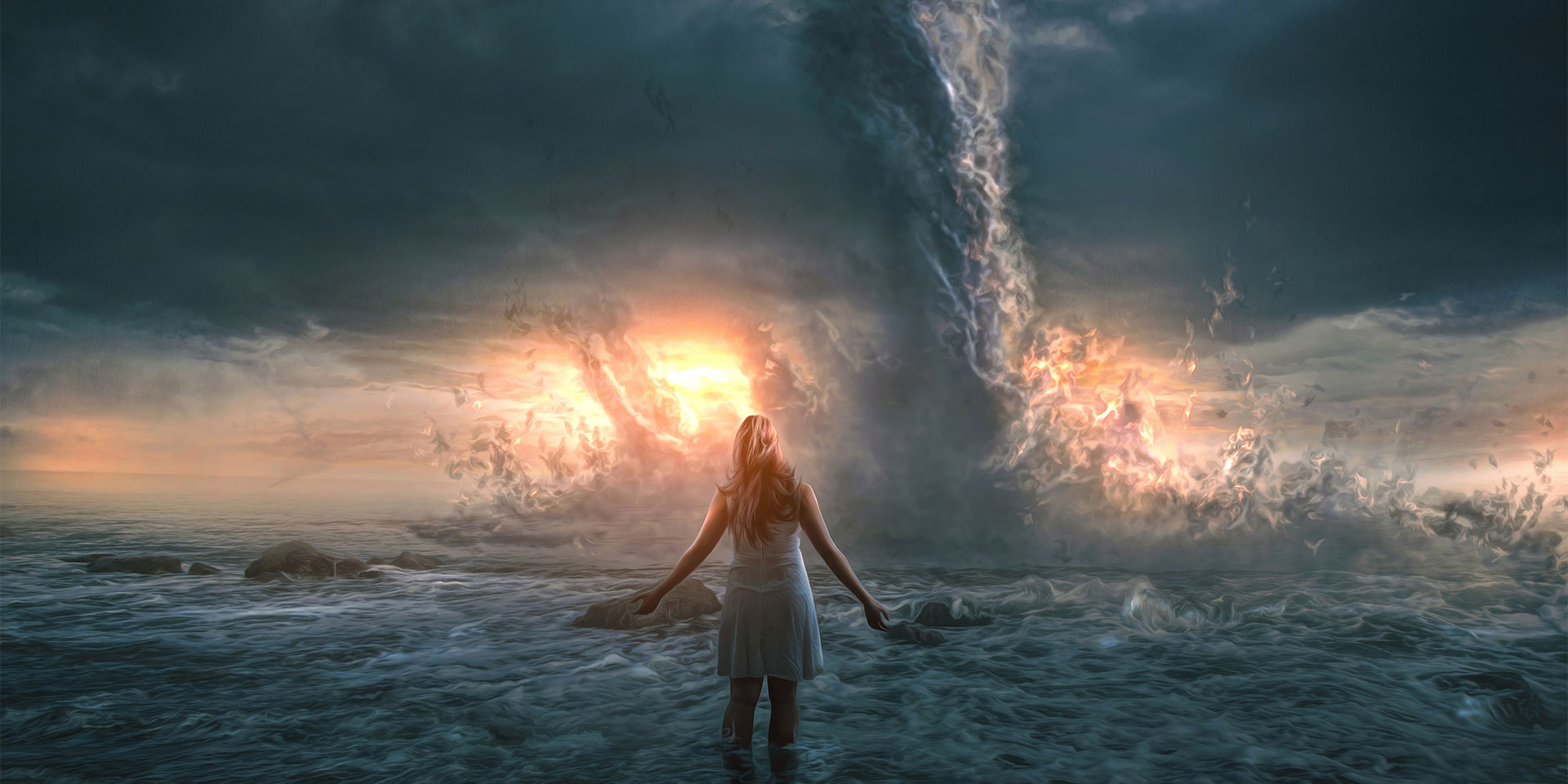“Logic suffers from a great logical fallacy: it believes that reality itself is of a logical nature. If it encounters something that cannot be understood logically, it will claim that this something doesn’t exist, but only appears to exist…” (Lucian Blaga, “Horizons and Stages”).
Although the end of the world seems to be a constant theme in the collective mind, generating numerous alternative scenarios, from millenarianism to Hollywood productions, it is paradoxically almost absent from philosophy. It seems to be marginalised, especially in Western philosophical culture, as if the subject itself does not hold the right relevance or status for the specific issues of philosophy. Let us attempt an investigation that will at least bring a ray of light into this obscurity: Why have philosophers, throughout the bimillennial Christian era, not been concerned with the biblical eschaton?[1]
Conceptual distinctions
To define our area of interest from the outset, we are not concerned with theological discourse, but with that which is circumscribed by philosophical thinking. Broadly speaking, philosophical thinking, as it has developed since modern times, differs from theological thinking in several ways.
Firstly, the themes to which it applies address the great concerns of humanity in the world (its origin, its nature, the origin of the universe, its evolution, the problem of death, freedom, consciousness, the problem of meaning, the infinite, the absolute, value, creation, matter, spirit, truth, movement, time and space, existence as a whole, etc.). In contrast to these themes, theological thinking limits its discourse to the relationship between humanity and divinity.
Secondly, philosophical thinking is based on the human capacity to reason, to explain or demonstrate, and to work with abstract concepts of the greatest generality about what exists, about being. Theological thinking works not only with concepts, but also with allegories, symbols, metaphors and analogies, and human reason sometimes proves inadequate or insufficient for understanding religious ideas, especially those of the dogmatic type, which cannot be demonstrated, or those considered mysteries.
Thirdly, philosophical thinking questions every vision, concept, ideology, and dogma, takes nothing for granted, and practises methodic doubt in the exploration of the world and the acquisition of knowledge, whereas theological thinking is articulated around a doctrine or creates a doctrine around which it subsumes all other theoretical approaches.
Another characteristic of philosophical thinking is that, where it encounters difficulties in acquiring and validating knowledge, or where knowledge is insufficient or rationally inaccessible, it suspends judgments and conclusions, until additional relevant data are accumulated. Theological thinking, on the other hand, presupposes the sui generis fallibility of human reason to comprehend and explain the universe of religion in its entirety, thus elevating doctrinal assumptions into the realm of the unspeakable, the unverifiable, the non-rational, or even the irrational.
Lastly, philosophical thinking enters into dialogue and accumulates the knowledge and conclusions offered by historical events, as well as by the other fields of culture (sciences, arts, mythology, religion, including theology, etc.) and raises them to the universal, processing them at the general human level. Theological thinking, on the other hand, does not have this totalising vocation which would open it up to other fields, and may even reject discourses of other kinds which do not confirm its ideology.
Tracing eschatology in philosophy
As we have seen, the subject of biblical eschatology is not treated systematically in the philosophical discourse of the various thinkers of the Christian era; it arouses only vague and ambiguous concerns. This is surprising when we consider that it is a subject that also touches the philosophical universe, since it involves answers to great questions such as the meaning of life, the origin and nature of humanity, the origin of the universe, the purpose of creation, the end of time, and so on. Moreover, if we consider that the entire history of mankind is divided into two epochs—before and after Christ—we have all the more reason to expect that philosophers, at least those who consider themselves religious, will deal with the subject of the end of time, the final day when the divine judgement will put an end to the history of our earth.
Even in Eastern theology, the approach to the subject seems sparse, as the Russian theologian Paul Evdokimov observed in the second half of the last century: “It must be said that there is no comprehensive dogmatic synthesis of eschatological data. With the exception of the articles of the Nicene Creed, which speak of the parousia, the judgement and the resurrection, Orthodoxy has no dogmatic formulations. Faced with the affirmation of a series of events with scriptural references, theological commentary and tradition itself are not sufficiently clear and homogeneous.”[2]
In the following, we will try to briefly illustrate Evdokimov’s assertions by widening the perspective to some philosophical landmarks of Orthodox, Catholic and atheistic spirituality.
Vladimir Solovyov
In our opinion, Vladimir Solovyov[3] is representative of Orthodox spirituality, as he systematised modern philosophical thought in the spirit of Slavic culture and Orthodox faith. Solovyov imagines an eschaton in the form of an unfinished scenario[4] conceived by the monk Pansophius (an expressive name suggesting “all wisdom”).
The scenario, plausible in the future of the 20th century, although linked to biblical texts (Revelation, Matthew 24, Mark 13, etc.), deviates visibly from the biblical spirit. It is marked by a pessimism about history, about the overwhelming evil in the world, and about progress as a symptom of the end. The philosopher proposes a history of the Antichrist’s action in the world, in which he predicts ecumenism, the formation of a union of European states, the creation of a single throne and a world-dominating emperor who embodies the Antichrist, and so on.
What intrigues and distances the scenario from the biblical eschatology of the Apocalypse of John is that it remains unfinished and somewhat “stuck” between the immanent forces of good (true believers) and those of evil—both unbelievers and, above all, false believers. In the latter category, the author includes his co-religionists, caught in the trap of ritual and cold legalism, devoid of authentic Christian love. However, the irony of his fate as a Christian philosopher is that, before writing this work, Solovyov’s political-religious initiative for solving humanity’s problems was precisely the unification of all religions under the banner of the papal institution.[5]
Joachim of Fiore
For Catholic spirituality, an early landmark of philosophical thinking is Joachim of Fiore (1135-1202), an Italian Catholic philosopher and theologian who studied the Book of Revelation. He interpreted it under the influence of millenarian creations, those theological and fantastical, even heretical writings that anticipated the eschaton around the year 1000 and later inspired social utopias. Their ethos was to project into the near future an ideal world purified of sin, evil, social pressures, and spiritual darkness.
Joachim of Fiore was even considered a prophet in his lifetime, advising King Richard the Lionheart in preparation for the Crusades, but his vision of the Christian future of humanity differed markedly from biblical prophecy. He foresaw the concrete, secular emergence of a new age of the Holy Spirit in 1260 (jumbling the numbering of the years of the Beast’s reign in history in the Revelation of John). In this new age, he envisioned a unification of believers and unbelievers under the high spiritual power of the Spirit, without the need for clerical intercession. Such ideas were declared heresy by the Catholic Church after his death, and his followers in Portugal even suffered the oppression of the Inquisition.
Umberto Eco and Carlo Maria Martini
Today, we must mention two famous Italian writers who, in a book of epistolary dialogues entitled “Belief or Nonbelief?”, have succinctly addressed the subject of the Parousia and the Last Judgement: the atheist philosopher, semiotician, and novelist Umberto Eco and the Catholic theologian and Cardinal Carlo Maria Martini. More specifically, Martini responds to Eco’s inquiries into the common thought and action dimensions of Christian believers and contemporary non-believers. In this dialogue, the vision of each is outlined: Eco appreciates that “this approach, which isn’t Augustine’s but also the Church Fathers’ as a whole, casts history as a journey forward—a notion alien to the pagan world… Christianity invented History, and it is in fact a modern incarnation of the Antichrist that denounces History as a disease… There is, nonetheless, an originally Christian vision of history whenever the sign-post of Hope on this road is followed. The simple knowledge of how to judge history and its horrors is fundamentally Christian…”[6]
Eco also highlights the “horror” that the Book of Revelation inflicts on the reader, as well as the confusion regarding the literal or mystical-spiritual interpretation of certain aspects (the chaining of the Devil for 1000 years, his return and the confrontation at Armageddon, etc.). In essence, the question posed by the novice Eco to the connoisseur Martini is this: can believers and non-believers together have a critical basis for analysing the mistakes of the past and for looking to the future without disinterest, if the end is also approaching with it?
Martini’s answer is a mobilising one: “We still have much to do together.” The theologian emphasises the meaning of “finality” that the eschaton has—that is, the definitive, decisive value of aspects of the present, not just of a mere “end.” Thus, on our way to this finality, however faintly we see it, we have time to correct ourselves, to become better.
Both thinkers agree that “today preoccupation with the end of time is more typical of the secular world than the Christian world,”[7] and Martini, in his formulations on the biblical prophecy of the Revelation, betrays his own doubts about the author of the text, as well as the inspiration for its inclusion in the biblical canon.[8]
A new seal?
The precarious way in which certain philosophers and theologians treat the biblical text of the prophecy of the eschaton makes us wonder and leads us to question whether Isaiah was also speaking of the present day when he lamented: “For you this whole vision is nothing but words sealed in a scroll. And if you give the scroll to someone who can read, and say, ‘Read this, please,’ they will answer, ‘I can’t; it is sealed'” (Isaiah 29:11). This may be one reason why eschatology is so rarely addressed by philosophers.
Blaga’s reflection on the disregard of what cannot be understood by logic in the picture of the world concerns not only logicians, but all thinkers who rely solely on reason to explore, get acquainted with, and interpret various aspects of reality; and the problematic context in which they do this is an anthropocentric one. This reflection is all the more justified because it belongs to a philosopher who is also a poet; as such, poets relate to the world through the lens of their artistic sensibility and, implicitly, of symbolic thought, as theologians sometimes do, while philosophers relate to the world through that of the logical-rational reasoning specific to philosophy and science.
However, the different aspects of a personality cannot be completely dissociated from one another. It is precisely their interweaving that leads to the acceptance that the world also contains mysteries that are inaccessible or inexplicable to the human mind. Thus the philosopher-poet realises that for some thinkers “every incomprehensible thing is a mystery; for others, on the contrary, every mystery is nothing but something incomprehensible. One needs, no doubt, more than the penetration of sight to feel where lies, among things that are not understood, the mystery.”[9]
When we think of the supreme mystery of the Incarnation of God in the person of Jesus Christ, the “mystery of lawlessness” of which Paul spoke, the mystery of the Day of Judgment, or the unfathomable mystery of God’s love for humanity, we understand why Blaga said that the Pharisees crucified Him only once, while Christians crucified Him countless times.[10]
Therefore, another explanation for the fact that biblical eschatology has been so little explored by philosophers lies in the spiritual precariousness of human beings in general, regardless of individual endowments—a precariousness that manifests itself in the disinterest and distrust of that which we cannot grasp with the instruments of reason, intellect, and logic; and, consequently, in the rejection of that which makes us uncomfortable because it holds up a mirror in which we see our moral weakness beyond reason and intellect. The prospect of universal divine judgement demands of each person an effort to struggle against their fallen human nature. This is the spirit in which Jesus Christ rebuked His contemporaries: “Hypocrites! You know how to interpret the appearance of the earth and the sky. How is it that you don’t know how to interpret this present time?” (Luke 12:56).
The Apostle Paul warned: “The person without the Spirit does not accept the things that come from the Spirit of God but considers them foolishness, and cannot understand them because they are discerned only through the Spirit” (1 Corinthians 2:14). Indeed, the non-rational, even the mysterious, and even the miraculous, can appear as foolishness to the limited human mind. And indeed, the door of spiritual understanding is often in danger of remaining closed if humans do not enable themselves to get to know the divine. This would mean turning away from oneself in order to receive that light beyond one’s own reason, the light “that gives light to everyone [which came] into the world” (John 1:9).
Corina Matei is a PhD associate professor at the Faculty of Communication Sciences and International Relations, part of the “Titu Maiorescu” University, Bucharest.




















